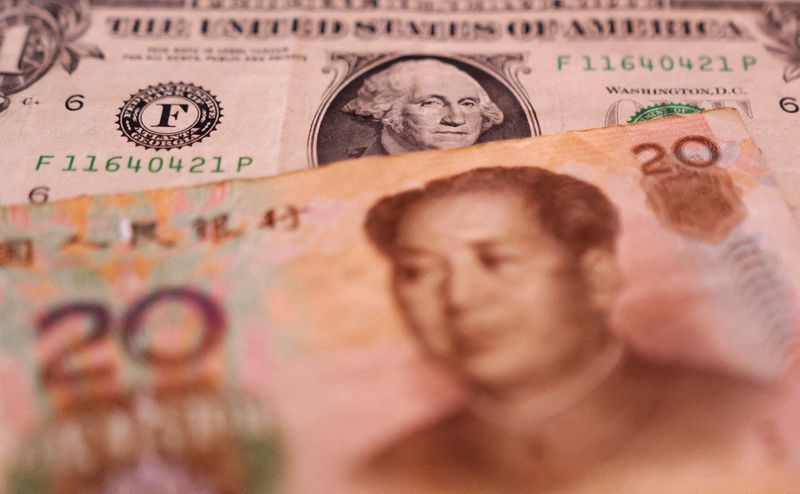By Rae Wee
SINGAPORE (Reuters) - China's currency is feeling the pressure from a possible return of Donald Trump as U.S. president, not just from speculators shorting the currency but also mainland exporters who have been hoarding dollars.
The yuan has been weak since early 2023, bearing the brunt of China's anaemic economy and low yields. The heavily managed currency has spent the past 17 months on the weaker side of the 7-per-dollar level and fallen roughly 2%.
Now, even as mainland stock markets celebrate Beijing's sweeping stimulus plans and investors rush back into the country, the prospect of Trump winning the November presidential election and his threats of bigger trade tariffs on China are heaping more pressure on the yuan.
It has weakened some 1.5% on a three-week rolling basis, the sharpest such fall in over a year.
"In the next 12 to 18 months, as China faces the prospect of higher trade tariffs from every direction, the easiest policy adjustment mechanism for the economy is likely to be currency depreciation," said Rong Ren Goh, a fixed income portfolio manager at Eastspring Investments.
It's a policy choice the country has made before.
During Trump's first presidency, the yuan weakened about 5% against the dollar during the initial round of U.S. tariffs on Chinese goods in 2018, and fell another 1.5% a year later when trade tensions escalated.
Market participants say the People's Bank of China (PBOC) allowed the yuan to weaken then, ostensibly to offset the impact of tariffs through better export revenues.
As part of his pitch to boost American manufacturing, Trump has this time promised voters he will impose tariffs of 60% or more on goods from China.
Brad Bechtel, global head of FX at Jefferies, reckons the yuan could shed as much as 12% over several months if Trump returns to the White House and Republicans win control of Congress.
Lemon Zhang, a macro and FX strategist at Barclays (LON:BARC), sees the offshore yuan trading at around 7.10 per dollar in the fourth quarter of this year, in the middle of the 7.00-7.30 range it has been in since June.
LOOKING OFFSHORE
Depressed bond yields at home are also undermining the yuan.
Yields on 10-year U.S. Treasury notes are double that on their Chinese counterparts, which merely return 2% a year.
Domestic investors and exporters have been stashing money abroad. Some of that sits as FX deposits at commercial banks, which had risen to $849 billion at the end of September, and the rest in overseas assets including dollar bonds issued by Chinese state-owned enterprises (SOEs).
Chinese buyers are piling into the Chinese SOE bonds because "if the onshore bond yield is so much lower than the offshore bond yield, it seems like a very easy decision for them," said Yifei Ding, a portfolio manager at Invesco.
Faced with the threat of more U.S. trade tariffs and the prospect of a weaker yuan, businesses are in no hurry to repatriate the cash kept abroad.
"Tariffs and Trump mean higher U.S. rates and a more expensive dollar, right?" said Ms Zhu, owner of a Shanghai-based electronic components exporter, who declined to give her full name.
"We do have accounts offshore, in Hong Kong. And we have kept some dollar deposits there, which I don't think we will convert any time soon."
Authorities seem to prefer a weak yuan. Major state-owned banks were seen buying dollars to slow down the yuan's ascent when it strengthened to an eight-month high in August, possibly to help protect export revenues.
The PBOC did not immediately respond to Reuters' request for comment.
While the yuan is on track for a third straight year of losses against the dollar, it has risen 1.8% on a trade-weighted basis.

"If Trump does what he says he's going to do... he's talking about a 60% tariff on China, that's bad," said Tony Sycamore, a market analyst at IG.
"I suspect it's probably the reason why Chinese authorities started to get ahead of the curve there - lowering monetary policy, talking about fiscal stimulus. Because if those tariffs do start to get implemented, it's not going to be good for Chinese growth, and you want to have a cushion there."